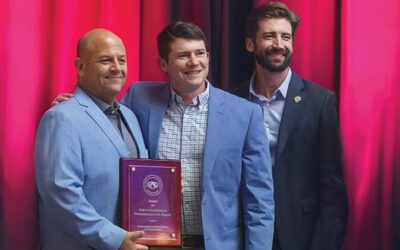When a patient comes in for an appointment with Theron McCormick, MD, he makes sure to eliminate all distractions. He shifts his body to face the patient directly. If they are sitting, he sits as well to make the patient feel more comfortable and less intimidated. If he wants to take notes or refer to information on his computer, he talks through those steps with a patient so they know he is still focused on them.
 “I think it’s important to build that trust and relationship in order to have a strong bond with the patient and their family,” said Dr. McCormick, a pediatric allergist and immunologist at Our Lady of the Lake. “I make it a point to actively listen. That means repeating what they say back to them to make sure I have heard it correctly. They immediately feel like they are talking to someone who is invested in what they have to say. That helps set the tone for the visit, whether it’s on video or in person.”
“I think it’s important to build that trust and relationship in order to have a strong bond with the patient and their family,” said Dr. McCormick, a pediatric allergist and immunologist at Our Lady of the Lake. “I make it a point to actively listen. That means repeating what they say back to them to make sure I have heard it correctly. They immediately feel like they are talking to someone who is invested in what they have to say. That helps set the tone for the visit, whether it’s on video or in person.”
During a visit, Dr. McCormick makes sure that patients know he remains interested in what they are saying even if he must multi-task. Often, he will share information from his computer with them to ensure everyone is on the same page. He prefers to let patients speak freely, without interruption, and will give non-verbal cues for them to continue.
“I think a lot of times, we as physicians and clinicians go into visits playing some degree of defense and we don’t always want to spend time on small talk,” he said. “But those conversations can be valuable. I remember one time, I asked a patient to tell me more about why they felt the way they did. I learned they had recently lost a loved one and were living out of their home because of a flood. Those were negatively affecting this person’s health, and I never would have known if I had not taken the time to let them share that and acknowledge that these were real factors at play.”
To help patients get the most out of each visit, Dr. McCormick encourages them to prepare in advance by bringing a list of concerns they want to discuss. This usually helps patients stay organized and ensure they have all of their questions answered. In addition, Dr. McCormick urges patients to use their provider’s online portal or app to fill out questionnaires ahead of time, thus allowing the visit to focus on more pressing matters.
All of these actions help support the Franciscan Missionaries of our Lady Health System’s goal to listen to and heal patients.
“One of the things I always remember is not to ask someone what is the matter with them, but ask what matters most to them,” Dr. McCormick said. “When I meet with a patient, I really want to know what is on their mind at that time. If I understand that, then other things fall into place and you can actively participate in their healing.”
Dr. McCormick said making sure patients know they are being heard has become even more important in the past two years, as many more visits are taking place virtually rather than in person. He and other clinicians have learned how to look at the camera during a visit, narrate their actions, ask for a moment to enter information into charts and other steps to reassure patients they are still engaged even if the communication is through a screen.
“That was not part of my original training, but it’s something we have all learned over time,” he said. “I’m proud that our organization is focused on making sure that we as clinicians are deliberate in how we interact with patients. It’s about enhancing the patient experience because we want to be a part of their health journey. We want to make that a positive experience, and that comes from building those relationships.”




